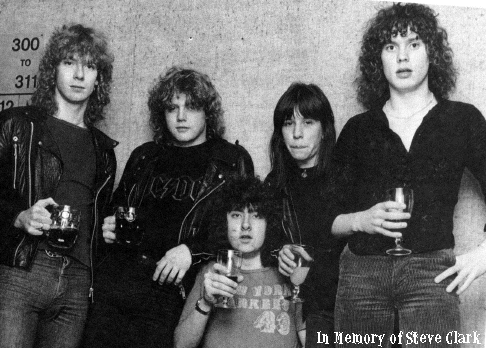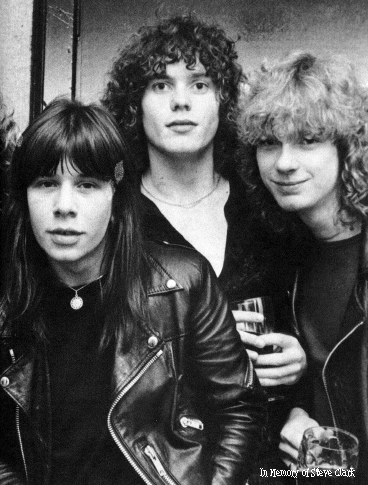|
|
|
Hit Parader: How has the success of Pyromania changed your lives? Steve Clark: Really, it hasn't changed it very much at all. Right now we're not seeing much of the money. In fact, we usually have to borrow a few coins from one of the road crew if we want to duck out of the hotel and pick up something to eat. We've been able to buy nice homes and nice cars, but after that what is there? We're not the type of band that wants limousines driving us around all the time. That's not our style at all.
Rick Savage: We're not in a band just to make lots of
money. We really enjoy what we're doing. If we were still at home, I'm sure we'd all be
playing in club bands for 20 quid a night. I'm not saying that the money's not a big
advantage, but it's certainly not the most important thing to us. The day it becomes the
primary motivation for what we're doing will be a sad day for all of us.
HP: Still, selling 6 million copies of an album has made you all millionaires. That's got to be a nice feeling.
SC: It makes my mom very happy. She was always concerned that I'd spend all my time playing the guitar, then end up working in the factories of Sheffield. I told her that a lifestyle like that wasn't for me, and maybe now she'll believe me.
Joe Elliott: We really don't sit around counting up the number of copies Pyromania sold. We know it did well, but the fact that it sold 6 million copies is fairly irrelevant to us. Any band wants to sell as many records as they can, for us it's because we want to reach as many people as possible with our music.
HP: How did it all start for Def Leppard? Tell us about the early days. RS: Back in the mid-'70s I was in a band called Atomic Mass with Pete Willis, who was our guitarist before Phil joined the band. We just played a lot of local gigs and basically our set consisted of old T Rex and Thin Lizzy songs. Our vocalist at the time wasn't very good, but he thought he was a star, so we sacked him and Joe came aboard.
JE: Actually, I came to the band mainly as a drummer than a vocalist. I had played drums in the band I was in previously, and I hadn't tried singing until our vocalist got sick one day and missed a gig. Once I stepped into the spotlight I knew it was more fun than sitting at the back of the stage behind the drum kit. I guess I'm a bit of a ham, because I enjoyed the attention the vocalist got.
HP: How did you guys come up with the name Def Leppard?
JE: I had studied art in school in fact I planned on a career as a graphic designer. I was always drawing things on pieces of paper, and one day I drew a picture of this strange looking cat with a hearing horn attached to its ear. The guys in the band loved the drawing, and they named it the deaf leopard. Obviously from there the transition of Def Leppard was fairly simple.
SC: It's a catchy name. We didn't want to call ourselves anything too traditional. If we had called ourselves the something-or-others we would have been just another group in the crowd.

HP: How tough was it getting gigs in those early days?
RS: The toughest part was convincing club owners to give us a shot. When we started out, punk music was the rage in England, and a lot of the guys who operated the clubs thought that any group that didn't have green hair and a pin through their noses couldn't attract a crowd. Once we convinced them to give us a shot, the rest was easy. We knew there were plenty of people out there who were into the type of music we were playing. Good rock and roll will always be popular.
HP: But you still had trouble getting a recording contract didn't you?
SC: Yes, we had to record and release our first EP on our own. We started on a label called Bludgeon Riffola Records and we pressed an EP called Getcha Rocks Off. We made a couple of thousand of them, and they disappeared overnight. It was incredible. That really opened the eyes of the record companies. When they saw that we could sell a couple of thousand EPs on our own, they couldn't get on the phone to us fast enough.
HP: After that, things moved along very rapid, though. Looking back, how do you rate your earlier albums, On Through The Night and High'n' Dry?
JE: I really get upset when I hear On Through The Night. I only wish we knew then what we know now. It sounds so immature to me - it sounds like a band that was just happy to be in the studio. Whenever I hear a song from the album on the radio or at a friend's house, I feel like going over and pulling the plug out of the stereo. On Through The Night was an album of '70s-styled rock. At least on High 'n' Dry we played music for the '80s. But with Pyromania we made a leap to playing for the 1990s, and with the next album we'll probably be playing music for the millennium.
SC: I think Joe's a little harsh on our early albums. I still like to listen to them occasionally, and we all still get a kick out of playing Rock Brigade in concert.
HP: One of the secrets of Def Leppard's success has been your use of videos. Why did you recently redo Bringin' On The Heartbreak from High'n' Dry?
RS: With Phil joining, the band's changed since we originally did that song. It's a great song, and we felt that if we remixed our recording and shot a new video for it, we could keep our names and faces in front of the people while we were away working on the new album.
HP: What's the next album going to sound like? Will it be similar to Pyromania?
SC: I guess in many ways it'll be similar, but we'll be working with a new producer. Jim Steinman, so the sound will naturally be a little different. There will be more songs like Billy's Got A Gun which are very moody and have a lot of emotion. I'm sure we'll have plenty of rave-ups as well, but we enjoy playing songs that have a little extra substance to them.
‘We're not in this band just to make a lot of money."
HP: How will working with Phil Collen change the band's sound? We know that most of Pyromania was recorded with Pete Willis on guitar.
SC: All Phil can do is improve our sound. He's an incredible musician, and he's always full of musical ideas. Pete was often too content to merely play along with what I was doing. Phil always wants to challenge my work. He plays against my solos which adds a degree of tension to the group's sound. He's given us a whole new dimension.
JE: I take full credit for getting Phil in the band (laughs). I had known him for years, and while he'd come by and jam with us occasionally. I guess I was his closest friend in the band before he joined. When we saw that we were having some troubles with Pete, Phil was the first person who came to mind. He's been a gem to work with.
HP: What do you prefer doing more, recording or touring?
RS: Actually, we enjoy both of them, but I guess I prefer the road over the studio. On Pyromania we worked with Mutt Lange, and we must have spent six months between preproduction and recording the album. There's a lot of frustration involved with recording in the studio. Sometimes you have to play the same song over and over. The stage is a pure rush of energy. Sometimes when you've been out on tour for three or four months you begin to wonder where you are, but that's part of the fun.
SC: I enjoy the road more too. When we record, it seems like you can be stuck in a windowless room for days. When you're on tour you get to see the people and the towns that make rock and roll great. The studio can be very sterile at times, and Def Leppard isn't a sterile band in any sense of the word (laughs).
"The success we're having is like a fantasy come true."
HP: How do you guys spend your time on the road?
JE: We're just like anybody else - we like to do a little sightseeing or go to the shops and buy presents for our friends. We like to have fun, and we'll do anything to make sure that everybody's happy. We're not shy about lifting a few pints every now and then, but that's all part of being in a rock and roll band.
RS: We're a pretty level-headed group. Most people think that it's wild parties and girls, girls, girls every night. We wish usually we don't even have time to get a full night's sleep before we have to move on to the next stop on the tour. But we wouldn't have it any other way. We love every minute of being Def Leppard, whether it's on tour, in the studio or just sitting at home with people we know. This is really a fantasy come true. All I hope is that someday somebody doesn't wake me up and tell me the dream is over.